Customer relationship management (CRM) is a powerful tool for businesses of a...
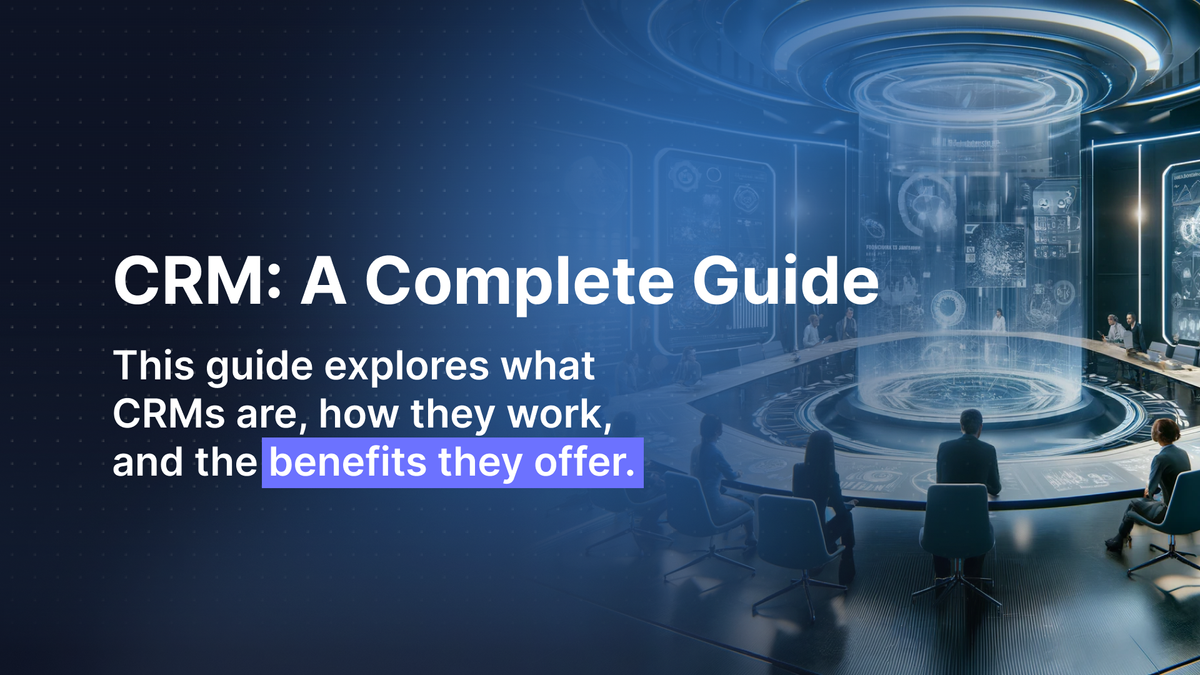
Managing a business today is trickier than ever. One has to organize and process massive amounts of data from customer interactions. Customer relationship management (CRM) systems are the saviour of modern businesses that let you track and manage all customer information in one place. The global CRM industry is expected to reach $129 billion in 2028.
These platforms are more than data management tools and help you identify sales opportunities, personalize experiences, and even help with upselling and cross-selling. Let's explore CRMs in detail and how they can benefit your business. We will also look into the power of integrating AI with your CRM for better customer insights and business growth.
CRM stands for Customer relationship management. It is a strategic business approach focusing on understanding and nurturing relationships with existing and potential customers. This involves a combination of technologies and business practices that help you understand your customers' needs and preferences.
A CRM helps businesses build stronger relationships with customers, leading to better customer experience, and business growth.
A customer relationship management system, also known as a CRM solution or platform, is a software tool that acts as a central hub for managing customer interactions. It helps businesses track and organize data on existing and potential customers, providing a complete picture of their customer base.
Think of it as a digital filing cabinet for your customer data. Here are some key functions of a customer relationship management (CRM) system:
This includes contact details, purchase history, communication history, and preferences – all in one easily accessible place.
A CRM system allows you to monitor potential customers as they progress through the sales funnel, helping you identify and close more deals.
Log and track all interactions, including phone calls, emails, and chat conversations. This ensures a smooth and efficient service experience.
Segment your customer base and target marketing campaigns based on specific demographics or interests, leading to more effective marketing strategies.
Free up your team's time by automating repetitive tasks like sending follow-up emails, scheduling appointments, or generating reports.
Modern CRMs can collect and analyze a wide range of customer details, helping them make data-driven decisions. AI integration takes this a step further, streamlining the process and delivering real-time insights into customer preferences and behavior.
Contrary to popular belief, customer relationship management systems aren't just for large enterprises. According to research, 91% of businesses with more than 11 employees now use a CRM. From startups to e-commerce giants, CRMs empower businesses to organize customer data, sales, and marketing campaigns in one central location.
Let's look at different businesses that can benefit from customer relationship management systems.
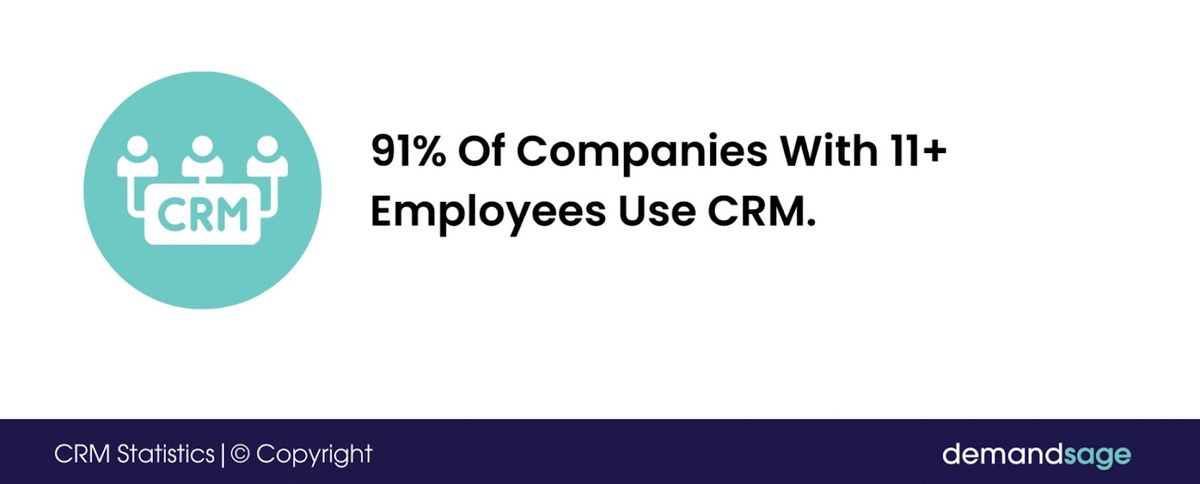
Startups and small businesses aiming for growth can benefit from customer relationship management software. These systems keep customer data organized, allowing them to stay engaged and provide excellent service from the start. According to a research report by Business.com, 25% of small to medium businesses are using CRMs to streamline their business procedures.
Modern retail and E-commerce businesses heavily rely on online interactions. CRMs go beyond basic customer records, helping them understand customer preferences, manage communication channels (email, chat), facilitate secure payments, and even integrate social media data for deeper customer insights.
Service-based businesses, where interactions are often one-on-one, benefit greatly from CRM. These systems keep connections in real-time, track tasks and activities, and automate routine tasks. E.g., a travel agency using a CRM to manage client preferences, trip details, and follow-ups – all in one place. This reduces administrative burden and ensures a faster turnaround for clients.
B2B companies often navigate lengthy sales cycles with multiple decision-makers involved. Let's say an IT firm tracks interactions with each contact at a client—IT dept., executives, procurement. The CRM tracks touchpoints (meetings, emails) with each person, ensuring everyone on the sales team is on the same page and increasing the chances of closing the deal.
MNCs and large-scale enterprises hold the biggest share of the CRM market. These systems optimize communication and data flow between departments (sales, marketing, customer service) and geographically dispersed teams. This unified view empowers them to deliver targeted marketing campaigns and ensure a consistent customer experience worldwide.
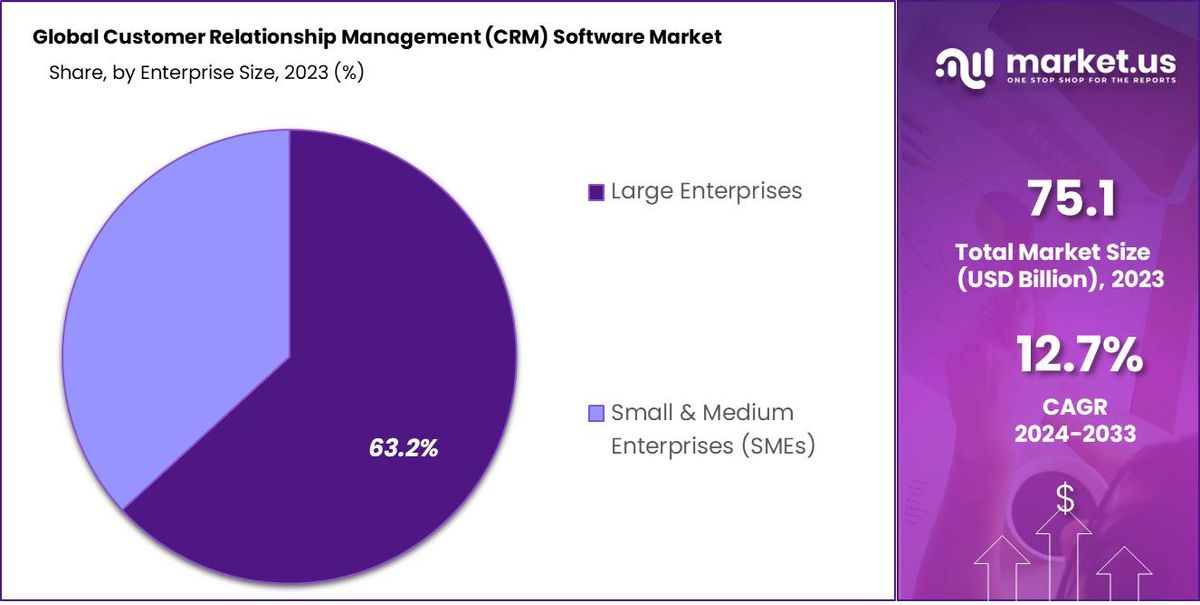
Businesses leverage customer relationship management (CRM) to unify customer data and enhance customer experiences. However, not all CRM systems operate the same way. Understanding the distinctions between them is important so you can make the best choice for your business.
There are two main categories of CRM systems: deployment model (on-premise or cloud-based) and functionality (operational tasks, data analysis, or collaborative features). We will take a look at both of them.
The deployment model refers to how a Customer relationship management system is delivered and accessed by your business. It has two categories:
On-premise CRM systems are installed directly on your company's servers. This gives you a high degree of control over your data and security. However, your IT team must also maintain the software and handle any updates. On-premise CRMs can be a good choice for businesses with specific security requirements or those dealing with very sensitive data.
Cloud-based CRMs are hosted by a third-party vendor and accessed via the Internet. They are offered in flexible monthly or annual subscriptions, offering flexibility and scalability for businesses of all sizes. You can access your CRM from any device with an internet connection, keeping your customer data readily available.
This focuses on the specific functionalities offered by the CRM system. Here are the three major types of CRMs based on functionality:
Operational CRM are designed to organize and automate core activities of a business. This includes sales automation (like tracking calls), marketing automation (like email campaigns), and service automation (like live chat support).
Analytical CRM aims to gather and analyze all sorts of customer data from different touchpoints. This data is then used to uncover hidden trends and preferences for marketing, sales, and service interactions. This ensures your customer data is up to date and provides valuable insights to improve customer experiences.
Collaborative CRM promotes teamwork by centralizing customer data and communication. It's a platform where marketing, sales, and service teams have 24/7 access to the same up-to-date customer information. This ensures that all teams are on the same page to deliver seamless customer service.
CRM systems act as a business growth catalyst by extracting rich insights from the customer journey. They also help by automating routine tasks, streamlining business operations, and promoting better collaboration between different teams within your company.
Let's see how customer relationship management can specifically help your business grow.
CRMs are the ultimate data hub for your business, centralizing and organizing all your customer information in one place. Imagine a single profile for each customer, storing details like preferences, preferred communication channels (email, phone), purchase history, and the total revenue they generate. These systems often integrate with dozens of third-party apps, giving you a real-time view of your customers' journey.
For instance, you can see if a potential customer downloaded a product brochure or abandoned their cart. These insights enable you to customize your marketing campaigns or send personalized reminders immediately.
One of the most significant uses of Customer relationship management systems is tracking prospective customers and generating leads. These systems help you systematically identify and approach new prospects. By assigning points or prioritizing leads based on your pre-defined criteria (age, job title, purchase history), CRMs filter out irrelevant leads. This allows you to focus your efforts on customers who are more likely to convert.
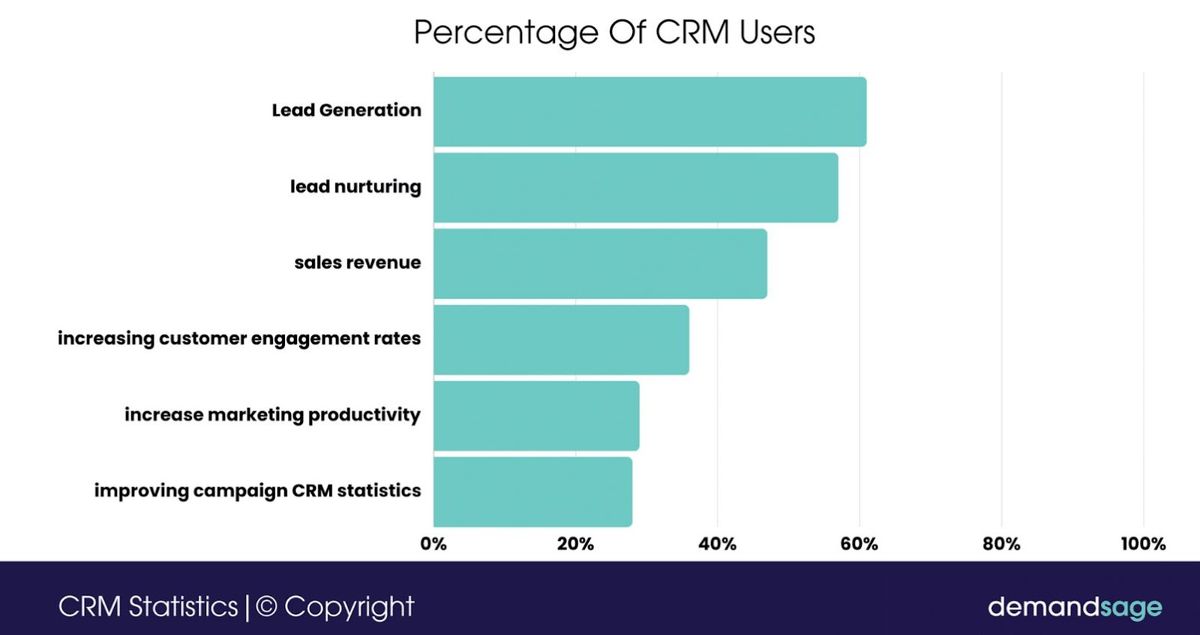
CRMs empower sales teams to quit the "one-size-fits-all" approach. These systems help create tailored sales processes for different services and industries. Let's say a CRM flagging that a potential client in the tech industry (unlike a client in healthcare) frequently reads industry blogs. The sales team can then personalize their outreach by highlighting relevant blog content, demonstrating a deeper understanding of the client's needs and interests.
This targeted approach increases engagement and shortens the sales cycles from 8 to 14 %, saving you valuable time and resources.
Customer relationship management acts as a productivity boosters by automating the mundane tasks that consume a lot of time. This allows them to focus on more complex projects and strategic initiatives. The most important technological aspect that businesses want in a CRM system is automation (almost 45%). Let's see a few examples of CRM automation:
CRMs provide a wealth of customer behavior data. Tracking and analyzing these interactions gives you a holistic view of how customers engage with your business. This empowers you to:
An effective Customer relationship management system goes beyond basic customer history and captures complete interaction data across all touchpoints (phone, email, chat). This equips customer service reps with a full picture of each customer's experience, eliminating the need to repeat information. Imagine a service rep instantly seeing past interactions, what was discussed, and how the customer felt.
CRMs integrated with ticketing systems become powerful help desk tools. From a single platform, customer support reps can track, manage, and improve interactions.
These are just a few of the many benefits CRMs offer. They can also improve forecasting accuracy, enhance team collaboration, and boost customer satisfaction.
Businesses leverage customer relationship management to track, store, and analyze customer data, automate tasks, increase collaboration, and, ultimately, enhance customer experiences. CRMs often integrate various applications to gather comprehensive data.
Recognizing the power of AI, businesses are increasingly integrating AI with their CRMs. This fusion is a real booster, maximizing CRM effectiveness and providing an unparalleled customer experience.
Integrating CRM with AI can give you access to customer insights, predict future behavior, analyze sentiment, and streamline processes for improved business efficiency. Here is how:
AI integration in CRMs takes customer support to new levels. AI-powered chatbots and conversational AI seamlessly handle routine inquiries, providing 24/7 customer support and faster resolution times. Synchronizing chatbots with your CRM allows you to track every customer support interaction. This data lets you measure each conversation's quality and your support team's overall performance.
AI in CRMs utilizes machine learning to analyze data in real time. This allows the CRM to gather insights and identify patterns in customer interactions across various channels (social media, email, phone). By analyzing demographics, preferences, and purchase history, AI empowers the CRM to fulfill its core purpose, i.e. , providing a holistic view of the customer journey.
AI leverages NLP (Natural Language Processing) and machine learning to analyze customer conversations from emails, social media, and support tickets. This allows it to understand customer sentiment, their likes, dislikes, and feelings towards a product or service.
For businesses, this is invaluable information to customer perception of their brand, helps identify areas for improvement, and enables targeted marketing efforts that resonate with the targeted audience.
While CRMs excel at centralizing customer data, their true power lies in business growth. Modern CRMs, especially those with AI capabilities, offer many long-term benefits.
From sales and marketing to customer experience and product development, here is how every aspect of your business can benefit from customer relationship management.
Modern customers prioritize tailored experiences. According to McKinsey research, at least 71% of customers expect businesses to provide them with a personalized experience. CRMs provide a comprehensive view of your customer journey, gathering high-quality data from all touchpoints. This data allows you to understand customer needs, preferences, and past interactions.
By leveraging these insights, you can deliver personalized experiences that cultivate loyalty and maximize customer lifetime value.
One of a business's biggest challenges is converting leads into sales. Stats show that CRMs can boost conversion rates up to 300%. CRMs, especially those with AI integration, streamline this process.
Real-time data helps you prioritize high-potential leads, manage existing opportunities effectively, and automate repetitive tasks. This smoother, data-driven sales journey increases conversion rates and boosts your bottom line.
Customer relationship management breaks down departmental silos and enables a collaborative working environment in a company. Suppose a sales representative shares valuable customer insights with marketing teams, who can tailor campaigns accordingly. This seamless information flow creates a better understanding between departments and optimizes your overall business strategy.
AI-powered CRMs help enhance your team's productivity and efficiency. By automating repetitive tasks (e.g., sending follow-up emails, scheduling appointments, generating reports), the staff can focus on high-value activities like nurturing customer relationships and closing deals.
For example, automating post-purchase surveys or lead scoring allows your sales team to invest more time building trust with potential customers.
Retaining existing customers is always more cost-effective than acquiring new ones. Using a CRM can improve customer retention by up to 47%. Once a lead becomes a customer, their purchasing history, transactions and preferences are recorded in the CRM.
CRMscan facilitates the customer retention process. Imagine a customer service rep instantly seeing a customer's past purchase history and preferred communication channels. This empowers them to offer personalized recommendations and proactive support, which leads to stronger customer relationships and loyalty.
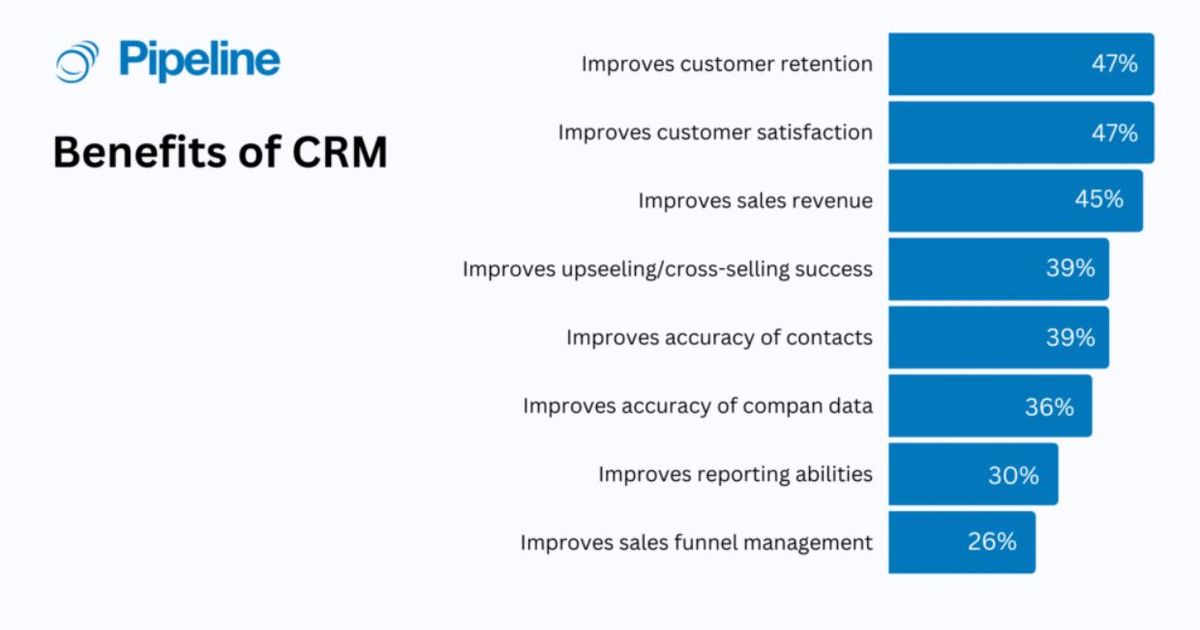
CRMs are built to grow alongside your business. Cloud-based Customer relationship management systems seamlessly adapt to increasing data volumes and user bases, ensuring your CRM remains a valuable tool throughout your business journey, from startup to established enterprise.
CRMs empower data-driven sales forecasting. By analyzing sales data, customer interactions, and pipeline activity, CRMs generate more accurate predictions. This empowers you to set realistic targets, optimize resource allocation, and make informed decisions to maximize sales pipeline growth. CRM software can boost sales by 29%, productivity by 34% and forecast accuracy by 42%.
Selecting the ideal customer relationship management system relies on your unique business goals and processes. Consider your industry, team size, and desired functionalities. Lets see how you can choose a CRM that empowers you to achieve your strategic objectives.
The best CRM aligns with your needs and objectives, What do you want to achieve from it? If you are a sales focused business go for CRMs with excellent sales pipeline management and lead scoring features. Similarly, if your focus is more on customer service, go for a platform with features like ticketing systems and self-service portals.
While well-implemented Customer relationship management delivers ROI, prioritize your budget. On-premise CRMs are a good option but involve upfront purchase, onboarding, and maintenance costs. If you are a startup or medium-sized business, cloud-based CRMs offer a more cost-effective solution with flexible subscription plans.
Choose a customer relationship management system with an intuitive and user-friendly interface. This ensures smooth adoption by all team members, regardless of technical background. The easier it is to navigate and utilize, the quicker your team gets up to speed, maximizing the CRM's value and driving the results you want.
AI is the way to go forward. While third-party app integration is crucial (email marketing, e-commerce), prioritize a CRM with built-in AI features. Look for functionalities like generative AI, AI-generated sales emails, or product recommendations. It should also seamlessly integrate with your existing AI applications to optimize workflows and deliver a frictionless customer journey.
Customer relationship management (CRM) goes beyond software. It empowers businesses to streamline lead generation, marketing, and customer service operations. By analyzing customer data, CRMs can even predict future behavior and personalize experiences.
Integrating AI support with your CRM extracts customer insights, like sentiment analysis. This enables you to tailor communication and proactively address customer needs, increasing loyalty and growth.
Choosing a CRM that integrates with your existing AI customer service tools can create a powerful business ecosystem. An AI-powered chatbot bridges the gap between your CRM and customers, providing real-time support and personalized interactions. This not only enhances the customer experience but also frees up your team to focus on high-value activities.
The cost of a CRM system can vary depending on the features, deployment model, and number of users. On-premise CRMs typically require a larger upfront investment, while cloud-based CRMs often have flexible subscription plans.
CRM stands for Customer Relationship Management, while CMS stands for Content Management System. CRMs focus on managing customer data and interactions, while CMSs focus on creating and managing website content.
Security is a major concern for any business that uses a CRM system. Reputable CRM vendors take data security seriously and implement various measures to protect customer data. However, it's important to do your research and choose a CRM vendor with a strong security track record.
Here are some common CRM implementation challenges:
CRM technology is constantly evolving. Here are some of the latest trends: